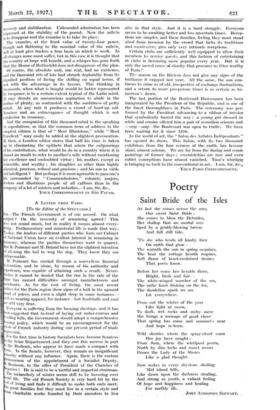A LETTER FROM PARIS.
[To the Editor of the SPECTATOR.1
II
'1R,—The French Government is of one accord. On what object ? On the necessity of remaining agreed ! This does not sound much, but in reality it means almost every- thing. Parliamentary and ministerial life is made that way. ro-day, the leaders. of different parties who form our Cabinet f National Union have an evident interest in remaining in armony, whereas the parties themselves want to quarrel. lint M. Poincare and M. Briand have not the slightest intention tf allowing the tail to wag the dog. They know they are indispensable.
M. Poincare has carried through a marvellous financial
*cstoration, and he alone, by reason of his authority and %-perience, was capable of attaining such a result. Never- ieless it cannot be denied that the rise in the rate of the ranc has caused difficulties amongst manufacturers and nerehants. As for the cost of living, the most recent ndiees for the Paris region show signs of a halt in the upward rend of prices, and even a slight drop in some instances- aeh as wearing apparel, for instance—but foodstuffs and coal re still very dear.
Everyone is suffering from the housing shortage, and it has en suggested that instead of laying out water-courses and Telling hills, the Government should adopt a comprehensive • !raising policy, which would be an encouragement for the hole of French industry during our present period of trade epression.
For the first time in history Socialists have become Senators the Seine Departement, and they owe this success in part the Radicals, who appear to have made a compact with hem. In the Senate, however, they remain an insignificant nority without any influence. Again, there is the curious henomenon of the appointment of a Socialist Deputy, • Bouisson, to . the office of President of the Chamber of Puties ! Ile is said to be a tactful and impartial chairman. The melancholy of winter seems still to be hovering over 'al life. The old French Society is very hard hit by the of living and finds it difficult to make both ends meet. great families feel they must live in a certain style and
u"SC charitable, works founded by their ancestors to live
!r
III
also in that style. And it is a hard struggle. Everyone seems to be awaiting better and less uncertain times. Recep- tions are simpler, and these families, feeling they must stand aloof from invasion by the crowd that lacks its traditions and savoir-vivre, give only very intimate receptions.
Certain clubs are sufficiently well equipped to allow their members to receive guests, and this fashion of entertaining in clubs is becoming more popular every year. But it is only the sacred cause of charity that procures us fetes worthy of Paris !
Th..: season on the Riviera does not give any signs of the brilliance it enjoyed last year. All the same, the sun con- tinues to shine as of old, irrespective of exchange fluctuations, and a return to more prosperous times is as certain as to- morrow's dawn.
The last portion of the Boulevard Haussmann has been inaugurated by the President of the Republic, and is one of the finest thoroughfares in Paris. The ceremony was per- formed by the President advancing to a ribbon of tricolor that symbolically barred the way : a young girl dressed in white and ermine offered him a pair of vermilion scissors and —snip—snip—the Boulevard was open to traffic. We have been waiting for it since 1870.
In the world of art, the "Salon des Artistes Independents" has opened its doors. This Salon, with its two thousand exhibitors from the four corners of the earth, has become staid, ahnost solemn. We are far from the daring and comic paintings of former days ; eccentricities are rare and even cubist conceptions have almost vanished. Time's whirligig is bringing us back to the conventional in art.—! am, Sir, &c., YOUR PARIS CORRESPONDENT.






























































 Previous page
Previous page